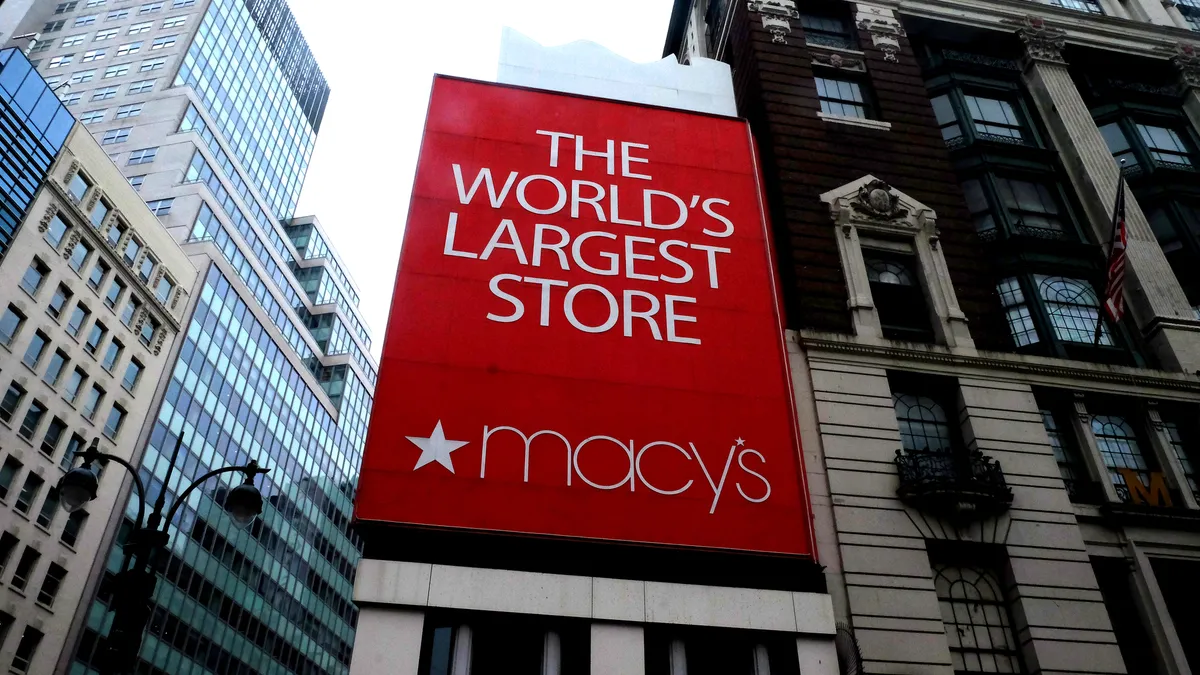It's quite possible that on Thanksgiving Day, during what's known in New York City as the "Macy's Day Parade," instead of the usual red, star-blazoned Macy's sign, a big "Amazon" billboard will feature prominently as the balloons and festive floats glide by.
At least, Macy's seems to fear that. At press time, there was no resolution to what would amount to a marketing blunder — the end of Macy's decades-long right to occupy the billboard jutting off one side of its flagship store. Then again, Macy's once made a habit of changing other department stores' names, after decades of them existing as home-grown brands.
On the streets, via television and through social media, the Macy's Thanksgiving Day Parade generates a billion-plus impressions, making it key for the launch of its own holiday sales, and the shopping season in general, advertising strategist Martin Ekechukwu said last year.
Although Amazon has been quite successful in replacing Macy's when it comes to apparel sales, it's not clear whether it's actually Amazon that hopes to replace Macy's on this billboard. In its filing for an injunction against renting the sign to a competitor, Macy's contends that Amazon is the likely party negotiating to take it over. Amazon hasn't responded to multiple requests for comment. By phone, Steven Kaufman, president of the Kaufman Organization, which is the managing agent for the building where the billboard sits, said that neither Kaufman nor building owner Rockaway KB have communicated with Amazon about the advertising space, and said he is at a loss as to why Macy's thinks they have. He declined to say whether another company besides Amazon was interested in the space. Asked about the likelihood of it remaining with Macy's he said it's "anybody's guess at this point, you know, we'll see what happens."
"Absolutely, there was no interaction [with Amazon]. They've got the idea in their heads that we did, but we didn't," he said. "We have a court date with them. They filed the lawsuit, and we have to respond."
Macy's predicament arguably predates the lawsuit by a century, when the department store declined to take over the corner store that holds the giant billboard. That building isn't — to the surprise of even many New Yorkers — part of the Macy's, but rather another edifice entirely. The New York Post earlier this month detailed how that came to be. According to that account, Macy's passed on the chance to buy the building — once in 1900 when it was first drawing up plans for its to-be-built flagship, and possibly again a decade later, when it sold to someone else for a million dollars. Instead, Macy's built its sprawling store around the relatively tiny building.
Macy's may not have seen fit to buy the building, but it apparently understood the importance of nevertheless keeping it in the fold in some way; hence, the massive billboard. And, decades ago, Macy's drew up a restrictive covenant that purportedly prevents any competitor from advertising on it. Whether that holds up is now for a judge to decide.
If Macy's fails and another retail banner goes up, however, it will be in good company. In the early part of this century, Macy's itself broke the hearts of many department store customers nationwide, as it changed the names of their hometown retailers — Hecht's in Baltimore and Washington, D.C., Rich's in Atlanta, Burdines in Miami, Lazarus in Columbus, Ohio, Famous-Barr in St. Louis, The Bon Marché in Seattle, Robinson's in Los Angeles and Foley's in Houston, among many others — all to Macy's.
"Iconic New York retail means so many things to so many different types of New Yorkers. But I do think in a way it's like a little medicine for Macy's to take, after just wallpapering the world with 'Macy's' and the red star," said Kristin Bentz, president of KB Advisory Group, whose Chicagoan mother "openly wept" when Macy's took over and renamed Marshall Field's.
But any change to the billboard may be more shocking to people outside of New York — to the tourists who gather for the parade, or who see it on TV or social media, according to Alan Behr, fashion industry attorney and partner at Phillips Nizer.
"I mean, this is New York. I once saw a baby elephant chained to a lamppost on Broadway. There was no keeper, no handler, just a baby elephant, chained to a lamppost on Broadway — nobody looked," he said by phone. "If nobody cared to look at an elephant chained to a lamppost on Broadway, no one's going to look at that sign. So, big disaster? No. An embarrassment, kind of an insult? Yes. And, to be determined, based upon whether there are compelling arguments against the very competently filed paperwork that was presented to the court."
For New Yorkers, then, Macy's will still be Macy's, no matter what happens to the sign. For now, at least.















